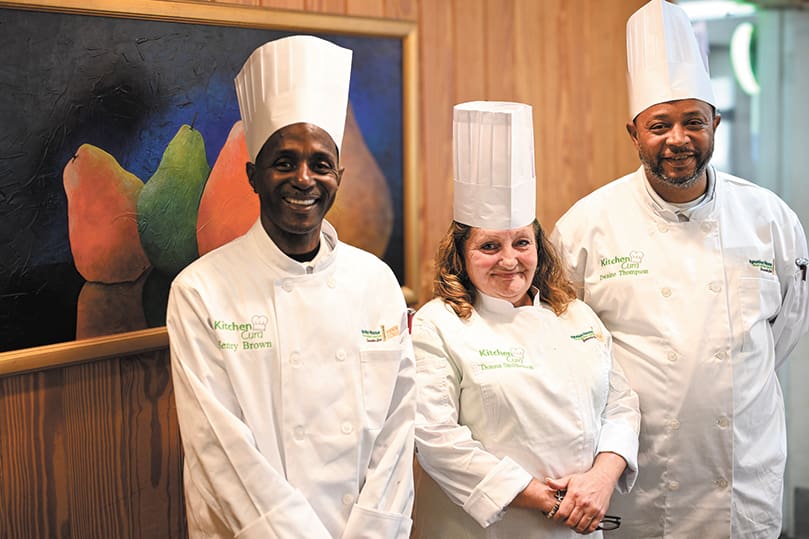 Photo by Andrew Nelson
Photo by Andrew NelsonAtlanta
Building futures with Kitchen Cura
By ANDREW NELSON, Staff Writer | Published December 3, 2024
SANDY SPRINGS—The kitchen is hustling with the clock ticking.
Dwaine Thomas crisply cuts the squash, prepping for his soup. Henry Brown, cast iron skillet in hand, simmers the apples over the stove top for his cobbler dessert. Donna Smitherman eyeballs honey dripping into a stainless-steel mixing bowl for the chicken salad.
Four months ago, these three novices started their journey for the Kitchen Cura, a transformative, food-focused internship at Ignatius House Jesuit Retreat Center.
At their graduation the next day, these dishes would be their showcase menu items for 50 guests and benefactors.
For each of them, the work demanded hard-earned skills they never imagined mastering. Thomas called it a “once-in-a-lifetime experience.”
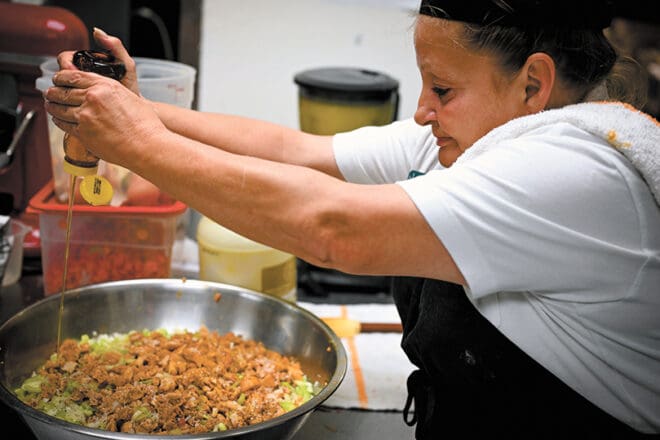
Donna Smitherman completed the food-focused Kitchen Cura internship at Ignatius House Jesuit Retreat Center, a program to help individuals rebuilding their lives after addiction and homelessness. As part of the graduation program, each of the three graduates prepared a showpiece dish for guests and benefactors. Smitherman adds honey to her smoked turkey salad. Photo by Andrew Nelson
During Kitchen Cura’s four-month program, students learn everything from personal presentation to mastering the hosting of meals.
The program’s name is inspired by the Jesuit concept of “cura personalis,” Latin for care for the whole person. It emphasizes the individuality of each person with their unique journey as child of God.
“From day one, unconditional love,” said Henry Brown, 60. “(The staff) were willing to help me out, whenever I felt disturbed or whenever I felt like things had gone wrong. They would comfort me.”
Ignatius House has been a haven for him, a place of serenity away from the downtown streets of Atlanta. He recently celebrated two years of sobriety. Brown aspires to be a kitchen steward, helping chefs by keeping a kitchen orderly.
The internship aids in students’ personal development, helping men and women who are homeless and recovering from addictions to find possible careers in the hospitality business. Along with the one-on-one time learning from experienced chefs, the students earn an hourly wage of $15, gaining some financial independence while working with a budget planner to set goals.
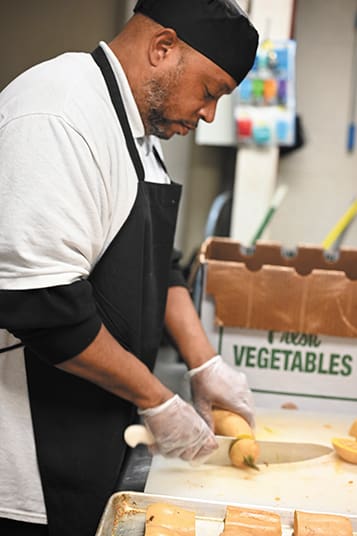
Dwaine Thomas cuts squash for his roasted butternut squash soup. Thomas first saw the soul of cooking and community at this grandmother’s kitchen table. The Kitchen Cura training reignited his passion for drawing people together with a meal. Photo by Andrew Nelson
Culinary work is a key industry in Georgia. The National Restaurant Association reported it’s a $34 billion business in the state with 10% of the jobs in the Peach State from food service. The Bureau of Labor Statistics reported there are roughly 4,500 chefs and head cooks employed in Georgia, earning an average salary of $55,000.
Putting a life back together
Donna Smitherman found a supportive environment, new skills and rededication to healing. The 55-year-old was homeless when a judge sentenced her to Mary Hall Freedom House, a residential program to aid women and families break the cycle of addiction and homelessness. She feels now the court order was a blessing to lead her to Ignatius House.
Drug counselors bring clients to the leafy retreat center grounds, overlooking the Chattahoochee River, to support their sobriety. They stay overnight in private rooms, soak in the scenic surroundings, attend group meetings and enjoy the food. During their stays, the kitchen staff recruits the retreat goers to apply for the program. All three of the graduates attended a retreat and were encouraged to submit applications.
For Smitherman, the program is more than what simply happens in the kitchen and wraps around “the complete healing process.”
“It’s given me a chance to get my life back together,” she said. One of Smitherman’s goals is to reunite with her family. “I don’t want to just go home all broken.”
Thomas, 47, learned about cooking and how it gathers a community around a table from his grandmother in Detroit.
Thomas has worked as a short-order cook in restaurants around Atlanta, focusing on quick, easy meals with little training. But this program reignited that deeper passion for food knitting together community. His goal is to distance himself from the rushed, simplistic approach to food preparation. In this “scratch kitchen,” all three novices prepared food from raw ingredients.
“I like to put my heart into it,” he said. Cooking is “putting something together for someone to love and for someone to love and appreciate, just by seeing it, tasting it and letting it fulfill them wholeheartedly.”
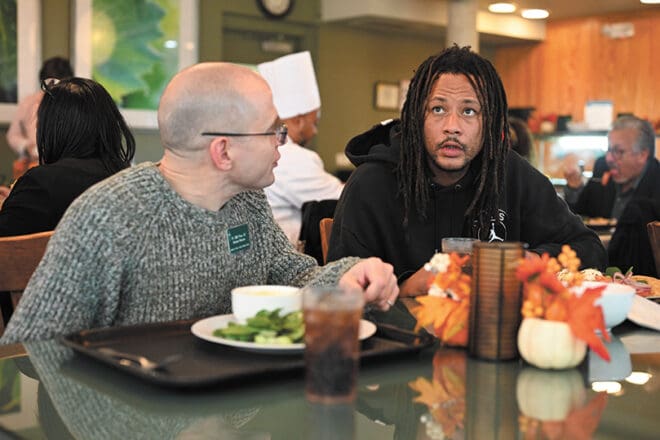
When interns graduate from the Kitchen Cura program, they cook and serve a buffet meal for guests and benefactors. Jesuit Father Bill Noe, a staff member of the Ignatius House Jesuit Retreat Center, talks with Scott Zeigler, at right, a guest at the graduation who is talking with staff about applying for the program. Photo by Andrew Nelson
He is undaunted by the road ahead to reach his goal of being a chef. He welcomes starting at the bottom rung of a kitchen to prove his skills. This journey requires dedication, and he knows it might take “15, 20, 30 years” to reach his goal. “I’m looking forward to those learning days, learning months, learning years that comes with it,” said Thomas.
Executive Chef Calisha Smith credits her mom for the program. She grew up with a family tradition of preparing pots of food for neighbors in need in her native Jamaica. That spirit inspired this program. Smith, Executive Sous-Chef Don Williams; and baker Therese Gionet-Sauve, take the students under their wing.
Her vision is a hands-on teaching program touching on the physical, emotional, spiritual and financial needs of participants. The kitchen is merely a tool—a way to remind students of their capabilities to accomplish hard things, said Smith. The immediate need is to develop marketable skills and find a job to help them ease back into society, she said.
The program focuses on teaching fundamental culinary skills, like knife mastery and food safety, leading to a ServSafe certification, which makes them desirable for hiring managers. It costs about $25,800 to run each cohort. Ignatius House Jesuit Retreat Center’s #iGiveCatholic campaign is dedicated to the effort this year.
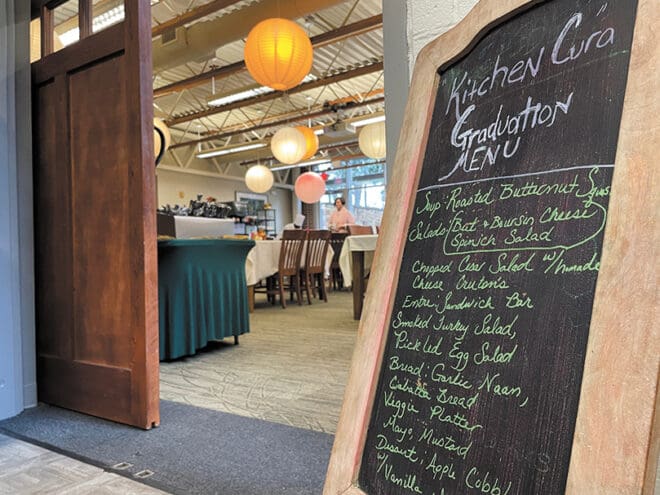
The Kitchen Cura program helps men and women in recovery from addition and homeless develop marketable skills for professional kitchens. As part of their capstone project, the graduates choose a menu and prepare and serve a buffet meal for guests. Photo by Andrew Nelson
The group takes a behind-the-scenes tour of an Atlanta hotel, observing how kitchens operate and enjoy a meal.
Williams, who is also a church deacon and a drug counselor, said he is happy to share what he knows because of his work experience. The students come in raw, eager to learn but unsure of themselves, he said. “They are anxious to do something, but they don’t know what to do. They really just want to be normal again,” he said.
While everyone thinks they want to be the chef, he reminds them leadership in the kitchen “starts with the broom in the hands, the rag in the hands.” Lessons go from humility and then to responsibility, he said.
The menu is written. The chefs’ dishes are chalked in a fancy script on an A-frame stand outside the dining room, where picture windows look out to autumn-colored trees and a bubbling fountain. A graduation full of speeches gives the budding chefs the opportunity to thank the benefactors and receive many accolades. Each graduate is presented with certificates, keepsake photos and a gift of a knife set. Lunch is served.
Later, with the guests gone and the dining room quiet, Smitherman has taken off her chef’s whites and the traditional toque blanche. Wet cloth in hand, she wipes down the tabletops.
“It was just what I needed in my spirit,” she said.